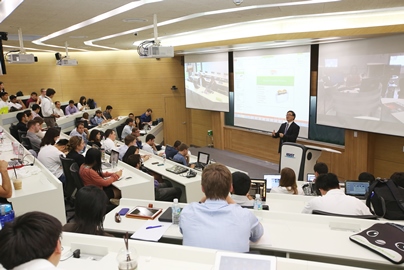On May 23, the finale of iPodia was hosted by KAIST in the IT Convergence Building (N1) at 4 p.m. This semester’s iPodia, a system of innovative learning started by Professor Stephen Lu of the University of Southern California (USC), had been conducted since January via classes in real-time so that students from five different universities - USC from the United States, Peking University (PKU) from China, Technion from Israel, and RWTH Aachen from Germany - can come together to learn from the best professors without having an actual physical presence, hence “no distance learning.” To conclude a semester of hard work and experience a different culture firsthand, the 18 teams of six students were gathered at KAIST to present the projects they have been working on throughout the semester. Team A (RWTH Aachen, Technion, and USC) presented on the topic “Market Research on the Design of Toasters” while Team B (KAIST, PKU, and USC) presented on “Finding a Solution for a Greener Campus.”

Cultural awareness was the key to this project; students were asked to globally innovate taking into account the culturally varying factors, such as in education, offensiveness, and needs. “To go to the countries to learn is expensive, but with iPodia, you don’t need to leave home and still get the same context.” said Vlad Podolsky, a teaching assistant (TA) from USC. Various communication methods, such as Skype, KakaoTalk, and Facebook, were used to collaborate on research.
The atmosphere during the presentation was quite unlike that of KAIST, a formal yet encouraging atmosphere where humor and interactions were welcome. Professors who could not physically be present watched in real-time. In the evaluation system, there was a unique criterion for an individual’s influence on his or her classmates. “iPodia greatly emphasizes peer-to-peer learning,” said Professor Lu. Sundong Kim, a graduate student and TA from KAIST, said, “I hope that the culture of actively discussing and sharing ideas will root itself at KAIST. Working with students of various diversities truly expands how you perceive the world.”
As it was KAIST’s first year to participate in iPodia, Professor Tae-Eog Lee, the head of the Education 3.0 team, along with its members, worked to coordinate the itinerary and arrangements. The visiting students stayed for one to two weeks, during the time which they experienced the Korean culture, made on-site visits to Korean corporations like Hyundai Motors, listened to seminars given by professors of various fields, and attended the Education section of the USC Global Conference 2013 held in Seoul on May 25.

